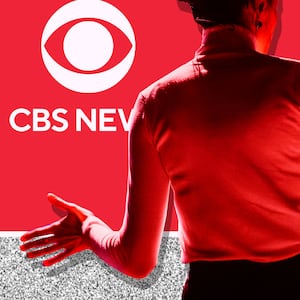The Washington Post is in the closing stages of the hunt for its new top editor, and looks set to finalize a decision in the coming weeks.
The Daily Beast spoke with seven knowledgeable people inside and outside the paper, including several with direct insight into the selection process. Over the past few weeks, these industry insiders said, a consensus has emerged that the internal favorite to replace long-time executive editor Marty Baron is Post national editor Steve Ginsberg, whose name has been floated as a potential successor in various outlets over the past year. Others believe the job could still go to New York Times assistant managing editor Marc Lacey, who insiders claimed is viewed as the strongest external candidate.
Both of those candidates have strong credentials but come with some drawbacks.
Ginsberg is broadly well-liked in the Washington Post newsroom, insiders said, at a time when there has been increasingly public tensions between many staffers and the paper’s management. But he is not seen as a major player in the broader media business and selecting Ginsberg, who is white, would buck the trend of powerful news outlets like CBS News, ABC News, MSNBC, and the Los Angeles Times making diverse hires for their top positions.
Lacey is a prominent Black journalist held in very high regard at the Times. A member of two Pulitzer Prize-winning teams, the former Times national editor and foreign correspondent would represent the kind of splashy big-name (and diverse) hire that insiders said Post publisher Fred Ryan may be interested in. However, Lacey is further down the managerial line at the Times and, insiders suggested, his hire would potentially irk some editors at the Post who may be viewed as more qualified than him.
Other names like interim editor Cameron Barr, National Geographic editor Susan Goldberg, and New York Times deputy managing editor Carolyn Ryan have been floated as potential successors in previous reporting. Media insiders have also noted that the paper’s process around this hiring has been unpredictable and intensely guarded.
Neither Ginsberg nor Lacey responded to requests for comment. A Washington Post spokeswoman labeled this story “wild speculation” but declined to address specific parts of the reporting.
Since Baron announced his departure early last year, the Post has cast a wide net in the hunt for his successor. At one point, the search included now-former ESPN executive Kevin Merida, who reportedly removed himself from the race and was named as the Los Angeles Times’ new top editor earlier this week. Multiple people familiar with the situation told The Daily Beast that Post staffers had privately expressed frustration that Merida, who is Black, was not courted more heavily for the job amid an industry-wide push for more diverse leadership.
Another name that had been touted for the gig was New York Times media columnist and former BuzzFeed editor-in-chief Ben Smith, though sources said discussions never reached a serious level on either side. (Smith is currently writing a book about digital media in the blogging heyday of the late aughts, The Daily Beast has learned, including accounts from Gawker founder Nick Denton and BuzzFeed CEO Jonah Peretti.)
To the chagrin of some staffers, much of the newsroom—including some relatively senior leaders—have been kept in the dark on the hiring process.
Multiple people familiar with the matter told The Daily Beast that unlike other major news outlets like ABC News, which put together a group of staffers to find a new network president earlier this year, there has been no official search committee for Baron’s replacement. Insiders at the paper said that Ryan, the publisher, has largely conducted the search himself, with some assistance from Wayne Connell, the Post’s human resources vice president.
Ultimately, Ryan’s decision could also have major implications for another newsroom that is also poised to begin its search for a new editor in the coming months. New York Times editor Dean Baquet is set to turn 65 later this year, the age when top Times masthead editors are typically expected to step down. Lacey, who is among the candidates primed to replace Baquet, would almost certainly increase his chances of getting the executive editor job should he turn down a possible offer to run the Post.
Meanwhile, Baron has not been involved in his own succession. One person familiar with the matter told The Daily Beast that the former executive editor’s interest in the Post at this point is almost entirely limited to a book he is currently writing about his time at the newspaper’s helm.
Earlier this year, the Post’s employee union sent a letter to the publisher seeking some input in the hiring process and noting that members hoped Ryan would hire a new top editor specifically committed to publishing work about underrepresented communities and the local D.C. area, fostering a more positive work environment, and tackling some lingering, thorny questions about social media policies.
Ryan said in response that while some of the requests were “consistent with our vision for this position,” he would not agree to hold an employee town hall on the matter. “Given the confidential and sensitive nature of the executive editor search, however, we do not plan to broadly address the search process with employees,” he wrote in a reply email.
The next editor will have to gear up for contract negotiations with a larger, more emboldened staff union under the NewsGuild, which represents a number of media unions including ones at The New York Times and The Daily Beast. People with knowledge of the situation told The Daily Beast that the union—which, unlike other newsroom unions, is voluntary, but includes editorial and many non-editorial commercial staff—has increased membership substantially over the past several years from around 30 percent of staff to nearly 60 percent.
Selecting Baron’s successor will prove to be one of the biggest decisions Ryan has made since becoming the Post’s publisher in 2014. People familiar with the situation said that Ryan was envious of Baron’s close relationship with the paper’s owner, Jeff Bezos, and tried to edge Baron out of some meetings with the Amazon founder. A Washington Post spokeswoman hit back, calling the allegations “categorically false.”
In many ways, the next top editor will inherit an easier job than the one Baron stepped into. Bezos purchased the paper in 2013, providing a financial lifeline that allowed the paper to expand and invest in ambitious projects that have reversed the paper’s fortunes. The size of the newsroom nearly doubled under Baron, boosting web traffic and digital subscriptions, and opening up more diverse revenue streams including a successful content software licensing business.
But the next newsroom leader will also have to contend with growing tension in the ranks about the handling of sensitive newsroom issues. Both Barr and Ginsberg were actively involved in implementing the decision to prohibit Post reporter Felicia Sonmez from covering stories related to sexual assault, essentially arguing that she was biased because of her own experience as a survivor. The decision was widely criticized internally, and the paper reversed course after it became public and sparked outrage online.
Others were upset about the recent decision to host Republican Sen. Josh Hawley for a live discussion, noting his key role in denying the legitimacy of the 2020 presidential election.
That Tuesday afternoon chat became contentious when Hawley complained the paper was trying to “censor, cancel, and silence me here.” But in a now-viral moment, reporter Cat Zakrzewski fired back: “Senator, we’re hosting you here.”





